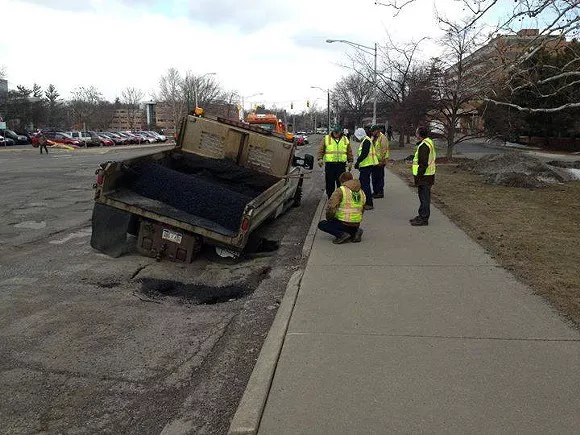Voters will be heading to the polls Tuesday, albeit not many, to decide whether Michigan's sales tax should be increased from six-to-seven percent — with the extra boost earmarked, mostly, for road repairs. After Republican Gov. Rick Snyder announced his call for more than $1 billion in additional funds for road repairs, this complicated ballot proposal is what we're left with. Still have some questions on what the hell Proposal 1 is about? When you get into the weeds here things ultimately get complicated, so we'll try to keep it to basic points on what Proposal 1 is all about:
Why am I voting on this?
This may be the easiest one. The Michigan Legislature, last December, was unable to answer the road conundrum itself. So it punted the issue to voters. Here's the kicker: that grand ploy hatched by the Republican-controlled Legislature will cost you, me, and our pals $10 million.
Why do we even need to raise taxes for road repairs?
Well, in a nutshell, most of the money in Michigan for roads comes from taxes levied at the pump. That hasn't been raised in decades; meanwhile, motorists simply drive less miles altogether.
So what's in this proposal?
This is where things get complicated. The goal here, according to boosters of the bill package, was to have a system that makes more sense. The sales tax we pay at the pump of 6 percent doesn't fund road infrastructure; instead, it supports public schools, cities, and townships. That bugs some people. If Proposal 1 is passed, here's the wonky core of what would take place, according to a nonpartisan analysis from the Senate Fiscal Agency:
- The sales tax would jump to 7 percent, from 6 percent.
- The sales tax at the pump would be eliminated.
- Divert a portion of Michigan's revenue generated by the state use tax to the School Aid Fund.
- Increase the Earned Income Tax Credit (EITC) from 6 percent to 20 percent.
- Replace the 19-cents-per-gallon fuel tax at the pump with a rate that adjusts annually based on 14.9 percent of whatever the average wholesale price of gasoline is.
- A new annual registration surcharge on hybrid cars — $75 for electric vehicles, $25 on hybrids
- $1.2 billion-$1.3 billion for roads
- $293 million for the State School Aid Fund
- $100 million for cities, villages, and townships in revenue to split
- $130 million for public transit
Yep, and that has plenty of people fuming. Even Attorney General Bill Schuette, a Republican who's almost certainly clamoring at the opportunity to run for governor in 2018, jumped into the fray to say this: "From a policy perspective, this proposal has a lot of potholes and pitfalls. It's a massive $1.9 billion sales tax increase that goes well beyond road funding. There's just too much under the tree." Of course, that group negates the added boost to basic public services like public transit and schools.
A sales tax is regressive, though, and impacts low-income people more, no?
Most definitely, but Proposal 1 aims to minimize the impact of the regressive sales increase, according to MLive's Jonathan Oosting.
Proposal 1 seeks to minimize the regressive affect of the sales tax increase by expanding the state Earned Income Tax Credit from six percent to 20 percent of the federal level. Michigan Gov. Rick Snyder and the Republican-led Legislature scaled back the EITC in 2011, but Democrats pushed to reverse that cut as part of the road funding package.
Hypothetically, very low-income workers could actually come out ahead if Proposal 1 passes, according to an analysis performed by ITEP for the Michigan League for Public Policy, which has long advocated for an EITC expansion.
A married couple with two kids, with both parents working full-time at minimum wage and earning a combined $33,252 a year, would end up saving $177 a year under Proposal 1 because of the EITC expansion, according to the analysis, which assumes each spouse will purchase 524 gallons of gas a year and will lose about .5 percent of their annual income due to the higher sales tax.
When's the vote?
Tuesday, May 5 — so be there.








